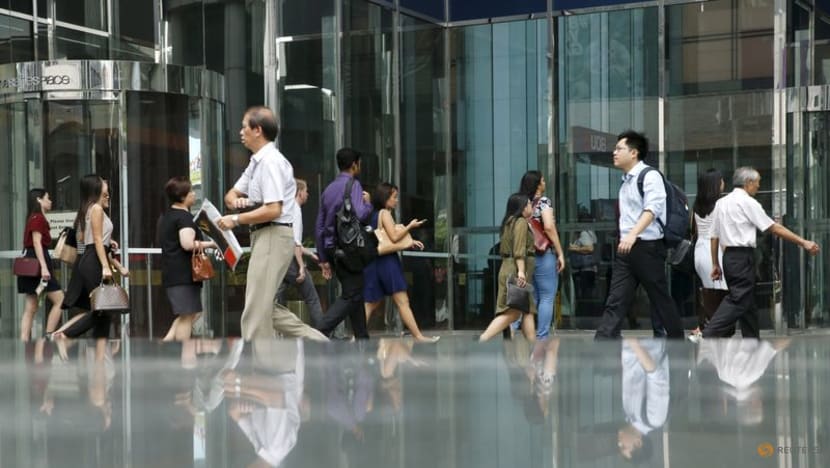What are the government fees wrongly charged with GST and who’s affected?
The government said on Wednesday (Feb 14) that it will be making refunds for Goods and Services Tax (GST) that was wrongly collected on 18 government fees.

Office workers walk to work during morning peak hour commute in the central business district in Singapore on Mar 24, 2016. (File photo: Reuters/Edgar Su)

This audio is generated by an AI tool.
SINGAPORE: Six government agencies had erroneously levied Goods and Services Tax (GST) on 18 fees for regulatory services, ranging from application fees for professional licences to administrative fees for renting out public flats, the Ministry of Finance (MOF) said on Wednesday (Feb 14).
The amount of GST wrongly charged is about S$1.5 million (US$1.1 million) a year, with the “vast majority” being charges of S$5 or less.
MOF said the government will start making refunds, with interest of 5.5 per cent a year, “based on available records” over the past five years.
This means that at least S$7.5 million will be refunded to affected individuals and non-GST registered businesses. GST-registered businesses are not eligible for refunds as they would have previously claimed the GST charges as input tax.
The agencies in question are the Housing and Development Board (HDB), Land Transport Authority (LTA), Urban Redevelopment Authority (URA), Singapore Food Agency (SFA), Office of the Public Guardian and the Council for Estate Agencies (CEA).
HDB alone accounted for over 70 per cent of the 200,000 erroneous charges each year.
GST is generally levied on government services such as the use of public sports facilities or the rental fees for hawker stalls. But it should not be charged for services that are regulatory in nature, MOF said.
At the moment, government agencies, like businesses, get to “assess and decide whether or not to impose GST on their fees based on broad principles and guidelines set out by MOF”. In this case, the six agencies had wrongly determined their fees as taxable provisions of services.
This error was uncovered last November during an internal review conducted by MOF.
All six agencies have stopped charging GST on the relevant fees as of Feb 14.
In a press release, the MOF and the six agencies involved apologised for the “erroneous charging” of GST and pledged to make the refund process “as seamless as possible”.
In separate releases, the agencies also provided more details of the regulatory service fees that were wrongly levied with GST and their respective refund processes. Here’s the breakdown:
1. Housing and Development Board
The HDB had wrongly charged GST on two administrative fees – renting out of public flats and the compulsory acquisition of flats due to infringements under the Housing and Development Act.
Flat owners who rent out their flat or spare bedrooms must apply to HDB and pay an administrative fee. Such fees were previously at S$20 and S$10 inclusive of GST. With the announcement on Wednesday, these have been revised to S$18 and S$9, respectively.
Those who have their homes compulsorily acquired by HDB due to law infringements, such as the unauthorised renting out of their flat, also have to pay administrative fees which vary depending on the complexity of each case. In this case, the average GST charged was about S$15.
HDB said it will, starting from mid-March, reach out to around 50,000 households who had paid GST on these fees across 160,000 transactions annually in the last five years, and whose records are available in its system.
These affected households will receive a notification via their Singpass app and a hardcopy letter by Jun 30. They will be asked to provide “some simple details” through a dedicated e-service on HDB’s website, and will receive an email once the refund is made to their bank accounts.
Beyond the five-year period, HDB said it will make “proactive refunds where records are available”.
Those who are not contacted by HDB by end-June can submit a refund request via HDB’s website by Dec 31, 2024. Those who require further assistance can also call its hotline at 1800-866-6812 between 8am and 5pm from Monday to Friday.
“As we expect a high volume of queries during this period, we seek the public’s patience and understanding if a longer time is needed to respond to their queries,” HDB said.
2. Land Transport Authority
LTA said it had wrongly collected about S$12,000 in GST per year on nine fees. They are:
- Class 2 bus service licence amendment fee
- Conversion fee from private hire car driver’s vocational licence to a taxi driver vocational licence
- Export Processing Zone entry fee
- Application fee for autonomous vehicle authorisation
- Application fee to keep deregistered or unregistered vehicles
- Application fee to change the garage address of a vehicle under the Keeping Scheme
- Application fee for a special purpose licence
- Application Fee for major modifications to registered vehicles, such as engine and transmission changes or the conversion of bi-fuel to petrol vehicle
- Application and extension fees for after-market vehicle accessories, such as exhaust and lighting system
Automatic refunds will be made automatically for erroneous charges made between Jan 1, 2019 to Feb 13, 2024, LTA said in its press release.
The refunds, ranging from S$0.70 to S$42.70 per transaction, will be done “progressively from Mar 1 to Jun 30, 2024” to those with bank accounts registered with LTA or have valid PayNow accounts. Once refunds are made, those eligible for refunds will receive e-notifications and SMSes, or hardcopy letters.
Those who do not have their bank account information registered with LTA will be notified by the authority to update their details via the OneMotoring website. They can also inform LTA of their valid PayNow accounts.
3. Urban Redevelopment Authority
The URA had wrongly levied GST on the processing fees for development applications and lodgments.
Since January 2019, about 37,700 applicants, namely business and landed property owners, have submitted their development applications and lodgments to the authority.
But URA expects the number of actual refunds to be “much lower as a significant proportion of these applicants could be GST-registered entities” that had claimed input tax and are not eligible for the GST refund.
The GST refund amounts range from S$35 for the change of use of premises to S$210 to S$560 for individual-landed housing developments.
For larger developments, where GST amounts can vary depending on the scale of the development, “the majority” of refund amounts is estimated to fall between S$10.50 and S$1,500. Applicants in this group are mostly businesses.
URA said it will conduct its refund exercise in two phases.
For those who paid the processing fees for their development applications and lodgments on or after Jan 1, 2019, the authority will be “proactively” contacting them via email from Mar 1 to Jun 30 this year.
For those who made the payments before Jan 1, 2019, they can apply for refunds via URA’s website from Jul 1.
URA said it is “committed to carrying out the refunds expeditiously” and called for those affected to provide required information within the stated timeframes to ensure refunds can be processed in a timely manner.
“We seek your understanding that the processing time for applications that require manual verifications may extend beyond the two months processing time we target to effect most refunds,” it said.
4. The Office of the Public Guardian
In the case of the Office of the Public Guardian, GST was wrongly charged on two applications, namely the registration of a Lasting Power of Attorney (LPA) and as a professional deputy.
About 10,000 donors and 50 professional deputies who paid application fees between Jan 1, 2019 and Feb 13, 2024 are affected. This excludes Singapore citizens who made LPA applications during the fee waiver period since September 2014.
The GST charged wrongly ranged from S$3.27 to S$24.77 for LPA applications, and S$35.98 for the registration of a professional deputy.
The office under the Ministry of Social and Family Development said it will reach out to those affected progressively via letters from March, starting with those who applied on or after Jan 2019.
Refunds will be made via PayNow by default. Those who do not have a PayNow account but have previously provided a local bank account number for citizen disbursement schemes, will receive the refund via bank transfer.
Affected donors may contact the Office of the Public Guardian if they do not hear from the office by Jun 30.
If the affected individuals have passed on, the executor or administrator of the deceased’s estate or the deceased’s next-of-kin may contact the office directly for the refund process.
5. Singapore Food Agency
The SFA had wrongly charged GST on three licence application fees, namely a licence to operate a food processing establishment, licence to operate a coldstore and licence to operate a slaughterhouse.
The refund amount ranges from S$10.30 to S$13.24, depending on the applicable GST rate at the point of licence application, it said in a notice titled “GST Refund” put out on its website on Wednesday noon.
“SFA will proactively reach out to all businesses that had made payment from Jan 1, 2019 to date based on our available records to advise them on the matter. We will subsequently reach out to businesses eligible for refunds duly,” it said.
For transactions before 2019, SFA will “require more time to retrieve the records as some old records may not be available”. Businesses in this category may write in to SFA by end-December to enquire on their eligibility for refunds.
6. Council for Estate Agencies
For CEA, the errors occurred with the application fees for real estate agency licences and the registration of real estate salespersons.
For the first misclassification, the wrongly charged GST ranged from S$7.00 to S$10.80 per transaction, depending on the prevailing GST rate at the time. This fee to apply or renew a real estate agency licence was raised from S$100 to S$120 from the start of this year.
The CEA will start making refunds to eligible non-GST registered businesses via bank transfer from mid-March.
For the second application fee – which is S$50 – the wrongly charged GST ranged from S$3.50 to S$4.50 per transaction, depending on the prevailing GST rate at the time.
CEA said it will require existing and former real estate agencies to submit declarations on whether they had paid the application fees on behalf of their salespeople.
It will be contacting these agencies from Mar 1 with details on how to make the declarations, it said.
“We seek your patience and understanding as CEA can only process refunds after the (estate agents) have submitted their declarations. Eligible (real estate salesperson) will receive their GST refunds from June 2024,” it added.
















